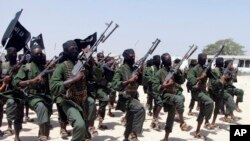The Somali military accused al-Shabab militants of deliberately displacing civilians from villages and towns they had captured before they could be reclaimed by government forces.
Military officials said al-Shabab's strategy is to prevent people from collaborating with the government. Al-Shabab also is "kidnapping" relatives of self-mobilized local forces supporting the government as a punishment, officials said.
The Somali government says troops seized nearly 70 localities from al-Shabab. The last major town seized, Adan Yabaal in the Middle Shabelle region, was almost empty when troops entered on December 5.
Military officials said some of the residents fled when the fighting got closer, but others were ordered to leave prior to that by al-Shabab.
"They took many families with them because they accused them of letting their sons join the Ma'awisley, and said that their boys had taken up arms against al-Shabab," said Brigadier General Abdullahi Ali Anod, spokesperson for the Somali military. The Ma'awisley are the local forces fighting alongside the Somali government.
Anod said the group's key reason for removing civilians from towns is to prevent people from establishing relations with the government. "We are fighting over territory and over the people."
He said the terror group is exercising a strategy that instructs their local commanders, "If you lose the territory, do not lose the people."
Somali President Hassan Sheikh Mohamud also said that appeared to be al-Shabab's plan as they forced people out of Adan Yabaal last week.
Government officials did not disclose the number of people living in Adan Yabaal, but an al-Shabab official said 10,000 people lived there.
'No one can kidnap 10,000 humans'
The group's shadow governor for the Middle Shabelle region, Yusuf Isse Kabakutukade, denied the group kidnapped the civilians. He said the president's remarks accusing al-Shabab of kidnapping residents of Adan Yabaal were a "lie" and "surprising."
"No one can kidnap 10,000 humans," Kabakutukade told the group's radio station. "Even if 10,000 people were kidnapped and taken by force, I would say where in Middle Shabelle region do you detain 10,000 people?"
He acknowledged that the residents had left the town but gave different reasons for that. "Some took up their arms, and they are in the forest with the mujahedeen, and some wanted to stay away from his [the president's] fitnah [trouble]," Kabakutukade said.
Government officials said the group also forced civilians out of Masaajid Ali Gaduud, one of the largest villages in Middle Shabelle.
More than 1 million displaced
This comes at a time when internal displacement caused by droughts and conflict is a major humanitarian concern.
Aid agencies this month reported that 1.59 million people had been displaced in Somalia within the first 10 months of 2022. The agencies reported more than 1 million drought-related displacements, at least half a million conflict-related displacements and upward of 6,300 protection violations across Somalia.
The Norwegian Refugee Council and the U.N. High Commissioner for Refugees said in a report that while drought and looming famine were the primary drivers of displacement, the renewed escalation of armed conflict had also contributed to an increase in forced displacement.
At least 47% of conflict-related displacements reported between January and October 2022 originated from the Hiran region, agencies said. Hiran has been the focal point of the government's offensive against al-Shabab.
Agencies said fighting in the region between al-Shabab and local clans has resulted in massive displacement, widespread destruction of property that includes water sources such as boreholes and wells, and telecommunication facilities, in addition to executions, immolation and arson.
Al-Shabab has been using these tactics for years, as witnessed in 2014 during the last major offensive to retake towns prior to this current operation.
In March 2014, when Ethiopian troops and a small number of Somali soldiers accompanying them were approaching El-bur town in Galmudug to reclaim it, the militant group ordered residents to leave, according to officials.
At the time, the group's fighters also damaged the water wells, an act repeated frequently during the current offensive, officials note.
"They destroyed the water wells, they took the generator," said Nur Hassan Gutale, the government-appointed mayor of El-Bur town.
"They have ordered the people to leave, but they also disconnect electricity and water supplies. Once electricity and water are discontinued, life will be nonexistent. Therefore, people would be forced to move to where they can find water. It's one of the main reasons they are taking people with them."
In Adan Yabaal, the militants also removed water pumps from the town's two wells. The government has since sent replacement pumps.
Prime Minister Hamza Abdi Barre visited the town Wednesday and delivered food aid, promising to reopen the hospital and schools. Officials who traveled with him said residents have started to return to the town. One of the elders who returned told Barre that more residents would come back once public services were restored.




